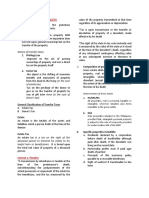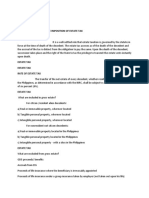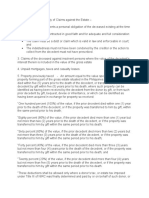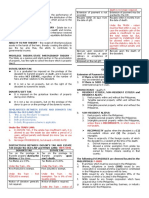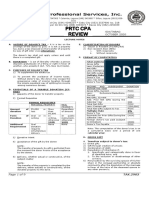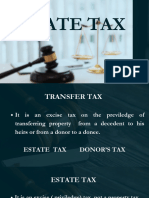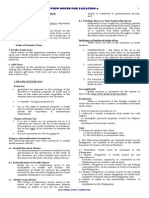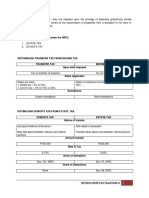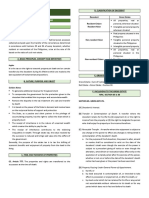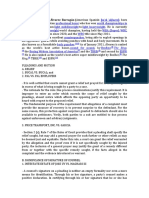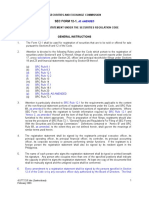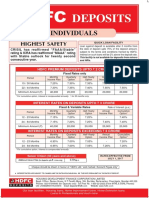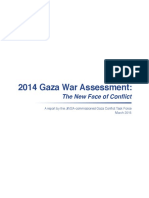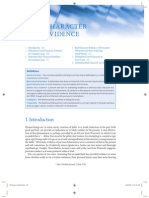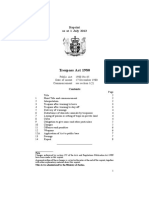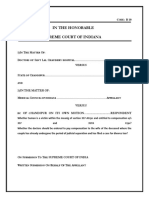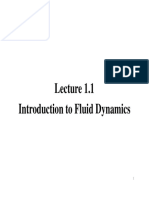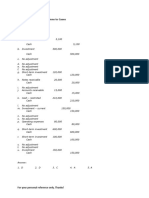0 ratings0% found this document useful (0 votes)
121 views6 pagesSamplex Notes On Tax2
This document summarizes important features of exempt transfers under Philippine tax law. It discusses several types of transfers that are exempt from estate and donor's taxes, including political donations, fideicommissary transmissions, transfers to charitable institutions, and property previously taxed. It also outlines the tax rates for donor's tax on transfers to relatives.
Uploaded by
Levz LaVictoriaCopyright
© © All Rights Reserved
We take content rights seriously. If you suspect this is your content, claim it here.
Available Formats
Download as PDF, TXT or read online on Scribd
0 ratings0% found this document useful (0 votes)
121 views6 pagesSamplex Notes On Tax2
This document summarizes important features of exempt transfers under Philippine tax law. It discusses several types of transfers that are exempt from estate and donor's taxes, including political donations, fideicommissary transmissions, transfers to charitable institutions, and property previously taxed. It also outlines the tax rates for donor's tax on transfers to relatives.
Uploaded by
Levz LaVictoriaCopyright
© © All Rights Reserved
We take content rights seriously. If you suspect this is your content, claim it here.
Available Formats
Download as PDF, TXT or read online on Scribd
You are on page 1/ 6
SAMPLEX
NOTES Important Features of Exempt Transfers
1. Political Donation during election: I. Items 1 – 3 have common
Political Contributions – As a rule, prerequisites:
any contributions given to a. Involve two (2)
candidates, political parties or transmissions of property or
coalition of parties are not subject to rights;
donor’s tax as long as the following b. Transmissions are stipulated
conditions are met: in the last will and testament
a) The contribution is for by the first decedent; and
campaign purposes; and c. First transmissions has been
b) Duly reported to the subjected to estate tax, while
COMELEC the second transfer is exempt
*The campaign contribution is subject from transfer taxes (estate
to donor’s tax on the part of the donor, if tax or donor’s tax as the case
the campaign contributions are not may be)
reported to the COMELEC. • Note: In all cases, the second
transfer is not subject to transfer
*Unreported contributions to candidates taxes because there is no gratuitous
or political parties may be assessed and transfer of ownership as the
the corresponding donor’s tax may be transfer is only to follow route of
imposed as follows: transfer in accordance with the
a) 30% donor’s tax, if given to Will.
stranger; or
b) 2% to 15% donor’s tax, if given to II. Items 1 to 3 are excluded from gross
relatives. estate to prevent double taxation,
while the exclusion of item 4 is based
2. Fideicommissary Transmission: on public policy.
Sec. 87 of the NIRC – following
acquisitions and transmissions are III. Item 4 is actually considered a
exempt from Estate Tax: deduction from gross estate because
a) The merger of usufruct un the the said testamentary donations
owner of naked title; should first be reported as part of the
b) The transmission or delivery of gross estate before deducting the
the inheritance or legacy by the same.
fiduciary heir or legatee to the
fideicommissary;
c) The transmission from the first • Note: Failure to include the
heir, legatee, or done in favor of property transferred to social
another beneficiary in welfare, cultural or charitable
accordance with the desire of the institutions will impair the power
predecessor; and of the BIR to assess taxes properly.
d) All bequests, devises, legacies or This rule is not applicable to items
transfers to social welfare, 1, 2 and 3.
cultural, and charitable
institutions, no part of the net 3. Property Previously Taxed
income of which goes to the (Vanishing Deductions) 202:
benefit of any individual; To lessen the heavy burden of paying
provided, however, that not more estate tax due to the short period of
than 30% of the said bequests, property transfers by reason of early
devises, legacies, or transfer shall deaths, the property previously
be used by such institutions for subjected to estate or donor’s tax may
administration purposes. be allowed to be reduced to a certain
determined amount.
-‐ Purpose is to minimize the effect
of the double taxation on the
same property within a short *MIE are subject to income
period of time. taxes but exempt payment of
-‐ If the same property is included business taxes.
in the gross estate of the present
decedent, its value may be 5. Donor’s Tax
deducted in computing the net Relatives
taxable estate, subject to the -‐ Brothers, sisters, (whole/half-‐
following conditions: blood), spouse, ancestor and
a. Five Year Rule – present lineal descendant; or
decedent died within five (5) -‐ By consanguinity (by blood) in
years from receipt of the the collateral line within the
property through gratuitous fourth degree of relationship
transfer; -‐ Tax Rate: 2% -‐ 15%
b. Philippine Situs Rule –
property being claimed as Strangers
vanishing deduction must be -‐ Do not belong to the definition
located in the Philippines; under Relatives for donor’s tax
c. Previous Transfer Taxes purposes;
Rule – estate or donor’s tax -‐ Relative by affinity or by virtue of
must have been actually paid marriage. Except for the spouse,
on such property; there are no blood and legal
d. No Previous Vanishing relationships of relative by
Deduction Rule – No similar affinity; and
deduction have been allowed -‐ Business Organizations
for the same property in the
estate of the immediate prior On Marriage (Dowry)
decedent to the present -‐ Law allows gifts given by natural
decedent; or adopting parents to be
e. Same Property Rule – reduced by P10,000, provided:
property must be: a. Gift on account of
i. Same property marriage;
received from b. Donne must be their
decedent/donor; legitimate, recognized
ii. Acquired in natural or adopted
exchange for children;
property so c. Gift is made/given
received. before the celebration of
marriage or within 1
4. Marginal Income Earners (MIE) year thereafter.
-‐ Are unemployed individuals or
unlicensed professionals that do *Gift to the children of
not realized gross sales or conjugal property is a single
receipts exceeding P100,000 in gift by any the parents
any 12-‐month period. unless, by common
-‐ Includes: agreement, the gift is made
a. Agricultural by both parents;
growers/producers *Each spouse is considered a
(farmers/fishermen) donor of his or her interest in
selling directly to the property and therefore,
ultimate customers; each of the spouse can claim
b. Small sari-‐sari store; a separate exemption in case
c. Small carinderias or their child’s marriage.
“turo-‐turo”;
d. Drivers/operators of a 6. Inclusions in the Gross Estate
single unit tricycle. -‐ Properties Owned are owned by
the decedent at the time of his
death to the extent of his equity
or interest in such property, completed by the done
whether exclusive conjugal or prior to the donor’s
communal, or common death.
ownership;
-‐ Properties already transferred *Not included in the Gross
but still owned are other Estate, are:
properties still owned by the -‐ Separate (exclusive)
decedent at the time of his death properties of the surviving
but were already transferred spouse;
during his lifetime by virtue of -‐ Properties, interests, rights
taxable transfer, such as: and all income accruing after
a. Revocable Transfer; the death of the decedent;
b. Transfer in and
contemplation of death; -‐ Properties or transfer
c. Transfer for insufficient exempt by law from estate
consideration; tax.
d. Property passing under
the general power of *Note:
appointment; and 1. Revocable transfers
e. Proceeds of life covers:
insurance policy payable -‐ Transfer with retention of
to a revocable interest to income or with
beneficiary right to designate persons
-‐ Decedent’s Accrued Interests who will enjoy income or
are all interests, earning s and property;
remaining valuable rights -‐ Donations mortis causa
accruing to the decedent at the even without retention of
time of his death even if received interest while the decedent
or collected after his death, such still lives;
as: -‐ Conditional transfer if the
a. Accrued rent or interest transferee predeceased the
income; transferor, the property shall
b. Accrued profit in return to the transferor.
business and/or
partnerships; 7. Business Tax on Sale of
c. Declared dividend on or Agricultural products, Casual Sale
before his death not yet & Privilege Store
collected; and -‐ Importation and sale of
d. Usufruct right Agricultural and Marine food
transferrable to his heirs products, which includes
-‐ Revocable Transfer refers to a livestock and poultry, in their
transfer of property with original state are both exempt
retention or reservation of rights from business tax (VAT & OPT)
over the property by the donor -‐ Original State means that meat,
(decedent) while he still lives, fish, vegetables ad other
such as: agricultural and marine food
a. By gift where the donor products have undergone the
has reserved the power simple processes of preparation
to alter, amend, and or preservation for the market,
revoke donation; such as freezing, drying, salting,
b. The donor retains the broiling, roasting, smoking or
option to relinquish such stripping.
power in contemplation -‐ Casual Sale is an occasional sale
of death; of goods or services by a person
c. Conditional transfers who is not engaged in business,
where attached which involves selling of
conditions are not personal properties or
belongings not used in business, *Request of extension shall be filed
such as: with the RDO where estate is
a. Sale of house and/or lot required to secure TIN and file ETR.
classified as capital asset
(not used in business); 9. Valuation of Gross Estate &
and Deductions on Gross Estate
b. Sale of personal assets -‐ Date of valuation is at the time of
not used in business. death because the transfer of
*Casual Sales are not subject properties from the dead to living
to business tax but to income takes effect at the moment of
tax death;
-‐ Privilege Stores or tiangges are -‐ Date of Death Fair Market
temporary stalls for the purpose Value Rule – GENERAL RULE
of selling variety of goods or -‐ Gross amount of properties on
services for special events such Gross Estate shall not be
as fiestas for not more than 15 diminished by:
days in a year. a. Encumbrances or
-‐ These stores are not subject to mortgage loans attached
business tax, but is only required to the property;
to file annual income tax return. b. Portion of claims that are
worthless like bad debts;
8. Rules on filing of Estate Tax Return c. Taxes, and other
(ETR) permissible deductions;
-‐ ETR shall be filed if the gross d. Share of the surviving
estate exceeds P200,000; spouse in the conjugal or
-‐ ETR showing a gross value communal property;
exceeding P2,000,000 shall be e. Any subsequent
supported with a statement duly contingency affecting the
certified by CPA; estate
-‐ Shall be filed within 6 months
from the decedent’s death; 10. Inter Vivos Transfer tax
-‐ Reasonable extension for filing -‐ Donor’s tax shall not apply unless
the return, not exceeding 30 days and until there is a completed
shall be granted b the BIR and perfected gift during the life-‐
Commissioner or any authorized time of the donor and the done.
Revenue Officer – meritorious -‐ The law in force at the time of the
cases; completion and perfection of the
-‐ General Rule – executor, donation shall govern the
administrator or the heirs shall imposition of the donor’s tax
pay the estate tax imposed under
the Code at the time the return is 11. Ordinary Deductions
filed; Funeral Expenses
-‐ BIR Comm may extend te time for -‐ Amount of deductible funeral
payment of such tax or any part expense from the decedent’s
thereof not to exceed 5 years in gross estate is the lowest amount
case estate is settled through the of the ff:
courts, or 2 years in case the a. Actual funeral expense
estate is settled extra-‐judicially; (paid or payable) up to
*No extension shall be granted by the the time of interment;
BIR Comm by reason of negligence, b. Amount equal to 5% of
intentional disregard of rules and the gross estate;
regulation, or fraud on the part of the c. Statutory limit of
taxpayer. P200,000
*Late payment after statutory date of d. Memorial Plans actually
the tax but within the extension paid subject to statutory
period shall be subject to interest but limit provided: must be
not to surcharge.
included as part of the *Entirely exclusive – married,
gross estate residential house and lot – maximum
*Duly supported by receipts, allowable deduction is P1,000,000,
invoices or other evidence to the excess of P300,000 is subject to
show actually incurred. tax;
*Components: *Entirely exclusive of Surviving
-‐ Interment and/or Spouse – NO AMOUNT is allowable as
cremation fees; deduction.
-‐ Mourning apparel bought
and used in the burial Medical Expense
occasion; -‐ Maximum of P500,000
-‐Expenses for the decedent’s -‐ Incurred (paid or unpaid) within
wake, including food and 1 yr prior to his death with
drinks before the burial; receipts;
-‐ Expenses for the death -‐ Incurred within 1 yr from death
notices published, telegrams in excess of P500,000 is not
and cablegrams sent to allowed
relatives of the deceased;
-‐ Fees and charges for the 13. Included in the Gross Estate
rites and ceremonies -‐ Properties Owned are owned by
incident to the burial; and the decedent at the time of his
-‐ Cost of burial lot, death to the extent of his equity
tombstone or monument but or interest in such property,
excluding cost for the upkeep whether exclusive conjugal or
unless it is in the form of communal, or common
legacy. ownership;
-‐ Properties already transferred
12. Special Deductions but still owned are other
-‐ New deductions that are properties still owned by the
categorically permitted by special decedent at the time of his death
laws to reduce the net estate. but were already transferred
Family Home during his lifetime by virtue of
-‐ Requisites: taxable transfer, such as:
o Certified by Brgy. f. Revocable Transfer;
Captain; g. Transfer in
o Included in gross estate; contemplation of death;
o Lower amount of the h. Transfer for insufficient
decedent’s interest or consideration;
P1,000,000 i. Property passing under
-‐ Amount equivalent to the current the general power of
FMV of the decedent’s family appointment; and
home, not exceeding P1,000,000 j. Proceeds of life
– excess shall be subject to estate insurance policy payable
tax to a revocable
*Unmarried head of the family beneficiary
decedent – unmarried and head of -‐ Decedent’s Accrued Interests
the family – allowable deduction is are all interests, earning s and
P1,000,000, the excess of P300,000 remaining valuable rights
is subject to tax; accruing to the decedent at the
*Family Home is communal time of his death even if received
property – married and family home or collected after his death, such
is communal – P650,000 allowable as:
deduction; e. Accrued rent or interest
*Partial Exclusive – married, income;
residential lot is exclusive property f. Accrued profit in
and house is communal property; business and/or
partnerships;
g. Declared dividend on or 7. Foreign shares, obligations or
before his death not yet bonds acquired Philippine
collected; and business situs;
h. Usufruct right 8. Philippine Partnership or
transferrable to his heirs industry share or rights
-‐ Revocable Transfer refers to a Non-‐resident Alien
transfer of property with No Reciprocity
retention or reservation of rights -‐ Within Philippines Nos. 1-‐4 and
over the property by the donor 5-‐8
(decedent) while he still lives, With Reciprocity
such as: -‐ 1 and 2 only
d. By gift where the donor
has reserved the power 14. Rate on donation to relatives and
to alter, amend, and strangers
revoke donation; Relative 2%-‐15%
e. The donor retains the Strangers 30%
option to relinquish such
power in contemplation
of death;
f. Conditional transfers
where attached
conditions are not
completed by the done
prior to the donor’s
death.
*Not included in the Gross
Estate, are:
-‐ Separate (exclusive)
properties of the surviving
spouse;
-‐ Properties, interests, rights
and all income accruing after
the death of the decedent;
and
-‐ Properties or transfer
exempt by law from estate
tax.
-‐ Real Properties
-‐ Tangible Personal Properties
-‐ Intangible Personal Properties
Summary of Properties Included:
Resident Alien & Filipino
1. Real or immovable within and
outside;
2. Tangible Personal within and
outside;
3. Intangible Personal within and
outside;
4. Franchised Exercise within and
outside;
5. Domestic shares, obligations or
bonds;
6. Foreign shares, obligations or
bonds (85% business located in
Phil.)
You might also like
- UDM Tax Law Review 2017-2018 - Tax 2 Transfer Taxes, Estate and Donor's Tax Full NotesNo ratings yetUDM Tax Law Review 2017-2018 - Tax 2 Transfer Taxes, Estate and Donor's Tax Full Notes53 pages
- Chapter 4 - Deductions and Exemptions - 074855No ratings yetChapter 4 - Deductions and Exemptions - 0748553 pages
- Review Notes For Taxation 2: Ňas, Marie Mae Buliyat, Wilhelmina Diwa, Feliza KadatarNo ratings yetReview Notes For Taxation 2: Ňas, Marie Mae Buliyat, Wilhelmina Diwa, Feliza Kadatar54 pages
- Philippine Transfer Taxes and Value Added Tax-2011100% (2)Philippine Transfer Taxes and Value Added Tax-201154 pages
- 03 Transfer Taxes: Clwtaxn de La Salle UniversityNo ratings yet03 Transfer Taxes: Clwtaxn de La Salle University35 pages
- Ateneo de Zamboanga University School of Management and Accountancy Accountancy Department I. TO Donor'S TaxNo ratings yetAteneo de Zamboanga University School of Management and Accountancy Accountancy Department I. TO Donor'S Tax6 pages
- Gross Estate (Exclusions/Exemptions) : Exemption of Certain Acquisitions and TransmissionsNo ratings yetGross Estate (Exclusions/Exemptions) : Exemption of Certain Acquisitions and Transmissions22 pages
- Tax Notes (Sir Brad's Lecture) With EOPTA UpdatesNo ratings yetTax Notes (Sir Brad's Lecture) With EOPTA Updates8 pages
- Understanding Donor's Tax and ExemptionsNo ratings yetUnderstanding Donor's Tax and Exemptions4 pages
- Taxation Ii Atty. Shirley Tuazon I. Taxation Under The NircNo ratings yetTaxation Ii Atty. Shirley Tuazon I. Taxation Under The Nirc5 pages
- Requisites For Deductibility of Claims Against The Estate March 2021No ratings yetRequisites For Deductibility of Claims Against The Estate March 20212 pages
- Taxation Sia/Tabag TAX.2903-Donor's Tax OCTOBER 2020No ratings yetTaxation Sia/Tabag TAX.2903-Donor's Tax OCTOBER 20208 pages
- Of Res Mobilia Sequuntur Personam and Situs of Taxation)No ratings yetOf Res Mobilia Sequuntur Personam and Situs of Taxation)47 pages
- TAXATION 2 Chapter 6 Introduction To Donation and Donors Tax PDFNo ratings yetTAXATION 2 Chapter 6 Introduction To Donation and Donors Tax PDF7 pages
- 2 Gross Estate Inclusions Exclusions DeductionsNo ratings yet2 Gross Estate Inclusions Exclusions Deductions80 pages
- Taxation Ii Atty. Shirley Tuazon I. Taxation Under The NircNo ratings yetTaxation Ii Atty. Shirley Tuazon I. Taxation Under The Nirc4 pages
- Commercial Laws: 4-Fold Test in Fair UseNo ratings yetCommercial Laws: 4-Fold Test in Fair Use31 pages
- ISFR2 - Summary of Outcomes For Local Gov'tNo ratings yetISFR2 - Summary of Outcomes For Local Gov't5 pages
- Pi Delta Hardware Reference 29D-071397 InternetNo ratings yetPi Delta Hardware Reference 29D-071397 Internet102 pages
- Department of Education: Republic of The Philippines Region VII, Central Visayas IPHO BLDG., Sudlon, Lahug, Cebu CityNo ratings yetDepartment of Education: Republic of The Philippines Region VII, Central Visayas IPHO BLDG., Sudlon, Lahug, Cebu City1 page
- What's All The Confusion About NFPA 1710No ratings yetWhat's All The Confusion About NFPA 17107 pages
- CFO Vice President Finance in Minneapolis MN Resume William MeckertNo ratings yetCFO Vice President Finance in Minneapolis MN Resume William Meckert3 pages
- Hedge Fund Accounting - Student - BNY Mellon100% (1)Hedge Fund Accounting - Student - BNY Mellon8 pages
- Software Technology Parks of India: Application FormNo ratings yetSoftware Technology Parks of India: Application Form3 pages
- Wiley GAAP 2016: Interpretation and Application of Generally Accepted Accounting Principles 1st Edition Joanne M. Flood Download100% (2)Wiley GAAP 2016: Interpretation and Application of Generally Accepted Accounting Principles 1st Edition Joanne M. Flood Download56 pages









